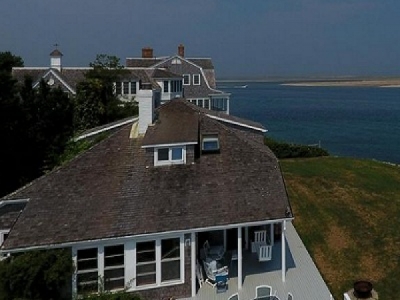
Posted on August 27, 2018
Selectmen have given the go-ahead for dredging in Pleasant Bay adjacent to the south side of the 2007 inlet to make the channel safer for commercial fishermen and recreational boaters despite concerns from some nearby property owners about the possibility of increased erosion.
Before the county dredge can begin deepening a portion of a channel that runs north to south along the inside of North Beach Island, the town must get approval from the state Department of Environmental Protection.
A “letter of permission” was issued Aug. 3 by the U.S. Army Corps of Engineers, authorizing the dredging of 11,000 cubic yards of sand within a 90,000-square-foot area. The letter allows an abbreviated permitting process for a project that’s deemed minor.
The Army Corps has jurisdiction over the area under Section 10 of the Rivers and Harbors Act of 1899, but won’t be performing the dredging. A Barnstable County dredge has been brought in to do the job.
The total cost for the project is expected to be $145,000, Chatham Director of Coastal Resources Theodore Keon said at the selectmen’s Aug. 15 meeting, where the board unanimously approved the work.
For the fishermen, the town, and the U.S. Coast Guard, the primary purpose of the dredging is to improve safety for boaters. The Coast Guard supports the dredging, citing the narrow channel as a potential hazard. The heavy traffic in the area includes both recreational and commercial fishing boats moving in and out of the bay. Although a no-wake zone has been established in the area, fishermen say it’s a blind corner.
The nonprofit Cape Cod Fishermen’s Alliance submitted a letter to the town in support of the dredging, explaining the group would normally urge caution when it comes to hydraulic dredging, but felt the benefits of the project outweigh the possible negative effects of disturbing the seafloor.
“It’s amazing to me that someone hasn’t had a collision there … it’s so narrow,” alliance CEO John Pappalardo said recently, adding that when fishing boats make a turn they really have to commit to it, with little room for error.
Because commercial boats often go out the cut in the early morning when it’s foggy and dark, visibility is a huge issue, he said.
The inlet known as the Chatham Break that has served as the main access point to the municipal fishing pier and mooring fields for the town’s commercial and recreational fleet since 1987 is closing up, to the point commercial vessels have had to rely on the 2007 cut to the north more often, Pappalardo said.
The project has to be done so that the large number of fishermen in town can keep operating, said Douglas Feeney, chairman of the Aunt Lydia’s Cove Committee.
“This is our livelihoods,” Feeney said.
Feeney acknowledged the dredging may only be a temporary fix, as the ocean will move the sand as it wants, but he’s already seen several boats run aground in the area.
But property owners are worried about safety in their own area.
Residents in the Minister’s Point area across the bay from the 2007 cut have been concerned about new dredging after they say previous dredging done nearby in 2017 caused major property damage.
Minister’s Point resident and self described “neighborhood nudge” Gerald Milden has been the face of the group and very vocal about concerns with the potential dredging. After March storms, part of his revetment wall fell into the water, Milden said. The wall had already been weakened before the storm by strong currents that were caused by dredging that left the water near his property deeper than the surrounding area, according to Milden.
The dredging related issues “almost drowned me in my sleep,” he said.
Milden said the town had told residents it would dredge past Minister’s Point all the way to Strong Island, but instead only dredged the Minister’s Point area, making a “trench” in the area. The trenching caused a riptide that has eaten away at the footing of waterfront homes, he said.
In a letter to the Army Corps, Centerville attorney Paul Revere III wrote that he has been hired by a group of landowners in the Minister’s Point area of North Chatham. The letter outlined why the Army Corps should not provide the town with the letter of permission, saying the project is neither an emergency nor “minor.”
Revere’s letter also alleged that the application submitted by the town for the Army Corps’ letter of permission included false information about resident notification.
In response to questions of whether residents that were marked as notified were actually notified, Keon said the town filed the proper documentation. Keon also said that the town has permitted areas for dredging in larger sections than what is planned to be dredged because the underwater topography is always changing. The area from Minister’s Point to Strong Island was not dredged because it was already deep enough and didn’t need it, he said.
Milden said he would pursue legal action against the town unless the riptide problem is addressed. He declined to disclose the names of individuals who are supporting his views or the potential lawsuit, saying many of them would like to keep a low profile.
The need for the dredging and the concern of Milden and others are separate problems, Feeney said. Although he sympathizes with the property owners, “that’s not this issue,” he said.
Source: Cape Cod Times





